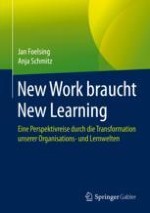2021 | OriginalPaper | Buchkapitel
5. New Learning – Fokusveränderung im Lernen
verfasst von : Jan Foelsing, Anja Schmitz
Erschienen in: New Work braucht New Learning
Verlag: Springer Fachmedien Wiesbaden
Aktivieren Sie unsere intelligente Suche, um passende Fachinhalte oder Patente zu finden.
Wählen Sie Textabschnitte aus um mit Künstlicher Intelligenz passenden Patente zu finden. powered by
Markieren Sie Textabschnitte, um KI-gestützt weitere passende Inhalte zu finden. powered by
